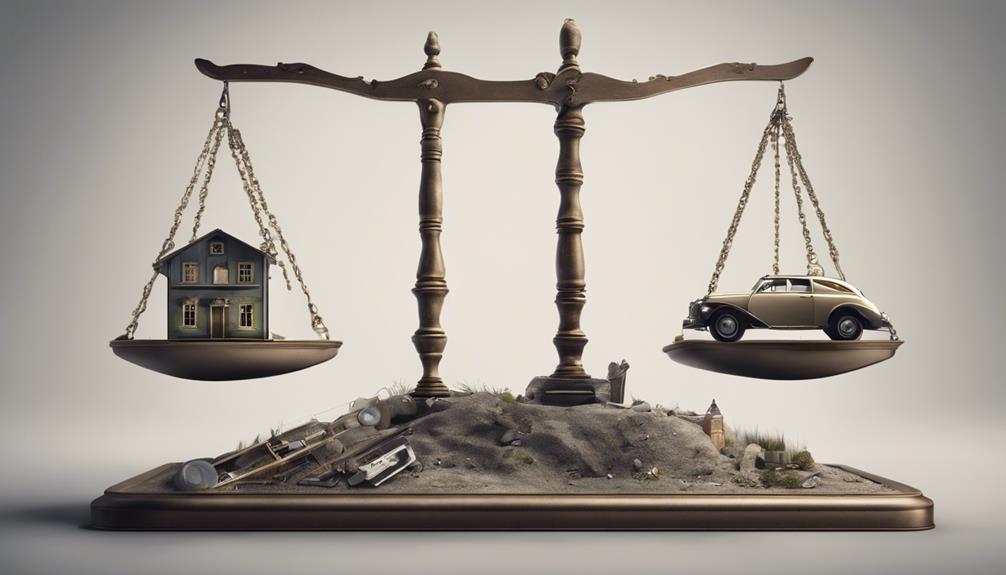In the complex maze of dividing assets during a divorce, trying to understand Georgia’s laws can seem like unraveling a knot that only gets tighter the more you try to pull it apart.
The complexities of dividing property in a divorce can be overwhelming, but understanding the nuances of asset division in Georgia is crucial for securing a favorable outcome.
As we delve into this guide, we uncover essential strategies, pitfalls to avoid, and the keys to safeguarding your assets amidst the storm of divorce proceedings.
Join us in unraveling the secrets to successful asset division in Georgia.
Key Takeaways
- Understand Equitable Distribution Laws for fair asset division.
- Categorize marital and separate property accurately.
- Value real and personal property transparently.
- Consider business ownership complexities in asset division.
Understanding Equitable Distribution Laws
When navigating Georgia divorce asset division, it's crucial to comprehend the intricate framework of Equitable Distribution Laws to ensure a just and equitable outcome for all parties involved.
In Georgia, equitable distribution laws govern the fair division of marital assets during a divorce. While many may assume that this means a 50/50 split, it actually focuses on achieving fairness based on various factors.
These factors include the duration of the marriage, the financial contributions of each spouse, and the future financial needs of the individuals involved. Separate property, such as assets acquired before marriage or through inheritance, isn't subject to equitable distribution.
Courts in Georgia carefully consider these asset division factors to ensure that each spouse receives a fair share of the marital assets based on their unique circumstances. Understanding these Georgia divorce laws and court considerations is essential for a fair and just resolution in asset division.
Differentiating Marital and Separate Property

Distinguishing between marital and separate property is a critical step in ensuring a fair and accurate division of assets in Georgia divorces. When navigating asset division, understanding the nuances between these two types of property is paramount for achieving an equitable outcome. Here are three key points to consider:
- Marital Property: Assets acquired during the marriage, such as real estate, investments, and vehicles, are typically considered marital property subject to division during a divorce.
- Separate Property: Assets acquired before the marriage, inheritances, and gifts designated as separate through pre-marital agreements fall under separate property and are usually protected from division.
- Asset Categorization: Accurately identifying and categorizing assets as either marital or separate is crucial for the equitable division of property in Georgia divorces. Ensuring the protection of separate property and the accurate allocation of marital assets is essential for achieving asset division accuracy and fairness.
Dividing Real and Personal Property
Navigating the division of real and personal property in a Georgia divorce requires a meticulous approach to ensure a fair distribution of assets. Real property, such as homes, rental properties, and commercial buildings, falls under the umbrella of marital property subject to division.
On the other hand, personal property encompasses cash, investments, retirement accounts, vehicles, and jewelry, all of which need to be accurately valued for proper distribution. Ensuring an accurate valuation of assets, especially complex ones like business ownership, is crucial to achieving an equitable outcome.
The disclosure process plays a vital role in this stage, as it's essential to identify all assets and financial obligations transparently. Moreover, in high asset divorces, considerations for spousal support can significantly impact the division of property, making it imperative to navigate this process diligently to secure a fair and just resolution for both parties.
Handling Divorces Involving Businesses

In handling divorces involving businesses, understanding the complexities of business ownership is essential for navigating the asset division process effectively. When dealing with business assets in divorce, several critical points must be considered:
- Marital Assets and Contributions: Determining the extent to which each spouse contributed to the business during the marriage is crucial. Disagreements often arise over the direct and indirect efforts put into the business by each party.
- Accurate Valuation and Legal Expertise: Proper valuation of the business is fundamental to ensure a fair division of assets. Seeking legal expertise to navigate the intricacies of business ownership can help in achieving an equitable outcome.
- ERISA and QDRO Rules for Retirement Accounts: Retirement accounts linked to business ownership fall under the purview of ERISA and require compliance with Qualified Domestic Relations Order (QDRO) rules for division. Understanding these regulations is vital to avoid complications and ensure a smooth asset division process.
Strategies for Asset Protection
For safeguarding your assets during divorce proceedings, it is crucial to implement effective strategies for asset protection. When navigating the complex terrain of divorce and property division in Georgia, it is essential to consider various tactics to secure your financial well-being. Establishing a prenuptial agreement can safeguard assets acquired before marriage, providing a clear outline of separate property. Maintaining separate bank accounts and transparent financial records is pivotal in delineating individual assets during divorce proceedings. Consulting with a financial advisor can offer valuable insights into the long-term implications of asset division, aiding in informed decision-making to protect your financial future. Additionally, seeking legal advice from a knowledgeable attorney specializing in high asset divorce cases is paramount to ensure comprehensive asset protection strategies are in place. By being proactive, honest, and strategic in your approach, you can navigate the complexities of divorce asset division with confidence and clarity.
| Strategies for Asset Protection |
|---|
| Establish a prenuptial agreement |
| Maintain separate bank accounts |
| Consult with a financial advisor |
| Be transparent about all assets |
| Seek legal guidance from a specialist lawyer |
Frequently Asked Questions
How Do You Split Assets in a Divorce in Georgia?
When splitting assets in a Georgia divorce, we consider factors like marital length, financial contributions, and post-divorce needs. Courts strive for equitable distribution, not always a 50/50 split. Marital assets acquired during marriage are subject to division, while separate properties usually remain untouched.
Understanding asset categorization and seeking legal advice are crucial in navigating this process effectively. Trust us, we've been through it and can guide you toward a fair resolution.
Who Has to Leave the House in a Divorce in Georgia?
In a Georgia divorce, neither spouse is obligated to vacate the marital home. We can continue living together until a court order or agreement dictates otherwise.
If safety concerns arise, a spouse can seek a temporary order for exclusive home possession. Factors such as home ownership and children's needs influence who stays.
It's crucial to consult with a divorce attorney to fully grasp your rights and choices concerning the marital home in Georgia.
What Is the Thomas Calculation in Georgia?
We've delved into the intricacies of the Thomas Calculation in Georgia divorces. It's a method crucial for valuing a spouse's business interest accurately. By evaluating revenue, assets, liabilities, and future earnings, it ensures fair property division.
Expert valuers handle this task for a transparent assessment. Knowing the Thomas Calculation is vital for spouses navigating high asset divorces with business ties in Georgia.
What Is a Wife Entitled to After 10 Years of Marriage in Georgia?
After 10 years of marriage in Georgia, a wife may be entitled to a portion of marital assets acquired during the marriage. Factors like the length of the marriage, financial contributions, and future needs influence asset division.
Marital property accumulated over the 10-year period could be divided equitably. The wife might receive a fair share of assets like real estate, investments, retirement accounts, and other marital property.
Consulting with a divorce attorney can safeguard the wife's rights in this situation.
Conclusion
As we navigate the complexities of high asset divorces in Georgia, it's crucial to remember that 97% of divorces settle before trial, highlighting the importance of strategic asset division planning.
By understanding the equitable distribution laws, protecting assets, and seeking legal counsel, we can achieve fair outcomes and secure our financial futures.
Remember, you aren't alone in this process, and with the right guidance, you can emerge from this challenging chapter stronger and more empowered.











